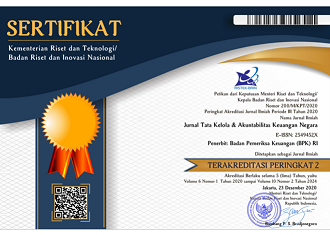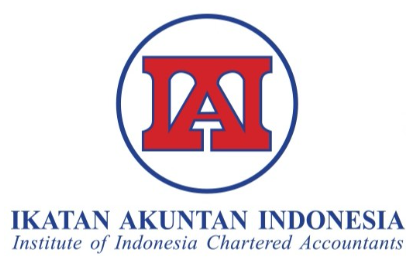The Effect of Accountability on the Efficiency of Local Government Expenditures
DOI:
https://doi.org/10.28986/jtaken.v8i2.647Keywords:
Accountability, Efficiency, Governance, Data Envelopment Analysis (DEA)Abstract
This study aims to examine the effect of accountability, as one of the governance aspects, on the efficiency of local government spending at the district/city level in Indonesia. This study uses panel data analysis with 228 districts/city government entities from 2014 to 2018. The analysis is conducted in two stages; the first stage measures the efficiency of every local government by using Data Envelopment Analysis (DEA) method. The second stage estimates the effect of accountability and other control variables on local government expenditure efficiency by regression using the Tobit method. The result shows a non-linear relation between accountability, which is proxied using the Indonesia Audit Board Opinion Index, and the efficiency of local government expenditure. Initially, accountability will proceed hand in hand with increasing efficiency; however, at a certain point, an increase in accountability will no longer increase the efficiency level of local government expenditure. Another control variable that positively relates to efficiency is population expenditure per capita. Meanwhile, the ethnic fractionalization index (EFI) and distance negatively affect efficiency. The results of this study have not been able to show a relation between political competition and the gender of regional heads with efficiency.
References
Afonso, A., & Fernandes, S. (2006). Measuring local government spending efficiency: Evidence for the Lisbon region. Regional Studies, 40(1), 39–53. DOI: 10.1080/00343400500449937
Afonso, A., & Fernandes, S. (2008). Assessing and explaining the relative efficiency of local government. The Journal of Socio-Economics, 37(5), 1946–1979. DOI: 10.1016/j.socec.2007.03.007
Almquist, R., Grossi, G., van Helden, G. J., & Reichard, C. (2013). Public sector governance and accountability. Critical Perspectives on Accounting, 24(7–8), 479–487. DOI: 10.1016/j.cpa.2012.11.005
Andriani, T. (2016). Efisiensi belanja pemerintah daerah dan dampaknya terhadap pertumbuhan ekonomi daerah tahun 2004-2013. (Unpublished master’s thesis). Universitas Indonesia, Jakarta, Indonesia.
Arbatli, E., & Escolano, J. (2015). Fiscal transparency, fiscal performance, and credit ratings. Fiscal Studies, 36(2), 237–270. DOI: 10.1111/1475-5890.12051
Arifin, E. N., Ananta, A., Wilujeng Wahyu Utami, D. R., Budi Handayani, N., & Pramono, A. (2015). Quantifying 'Indonesia's ethnic diversity: Statistics at national, provincial, and district levels. Asian Population Studies, 11(3), 233–256. DOI: 10.1080/17441730.2015. 1090692
Ashworth, J., Geys, B., Heyndels, B., & Wille, F. (2014). Competition in the political arena and local government performance. Applied Economics, 46(19), 2264-2276. DOI: 10.1080/00036846.2014.899679
Barankay, I., & Lockwood, B (2007). Decentralization and the productive efficiency of government: Evidence from Swiss cantons. Journal of Public Economics, 91(5-6), 1197-1218. DOI: 10.1016/j.jpubeco.2006.11.006
Bauhr, M., & Grimes, M. (2014). Indignation or resignation: The implications of transparency for societal accountability. Governance: An International Journal of Policy, Administration, and Institutions, 27(2), 291-320. DOI: 10.1111/gove.12033
Benito, B., Bastida, F., & García, J. A. (2010). Explaining differences in efficiency: An application to Spanish municipalities. Applied Economics, 42(4), 515–528. DOI: 10.1080/00036840701675560
Benito, B., Faura, U., Guillamon, M.D., & Rios, A. M (2019). The efficiency of public services in small municipalities: The case of drinking water supply. Cities, 93, 95-103. DOI:10.1016/j.cities. 2019.04.016
Boetti, L., Piacenza, M., & Turati, G. (2012). Decentralization and local 'governments' performance: How does fiscal autonomy affect spending efficiency? FinanzArchiv- Public Finance Analysis, 68(3), 269-302.
Borge, L. E., Falch, T., & Tovmo, P. (2008). Public sector efficiency: The roles of political and budgetary institutions, fiscal capacity, and democratic participation. Public Choice, 136, 475–495. DOI: 10.1007/s11127-008-9309-7
Charnes, A., Cooper, W. W., & Rhodes, E. (1978). Measuring the efficiency of decision-making units. European Journal of Operational Research, 2(6), 429–444. DOI: 10.1016/0377-2217(78)90138-8
Christensen, L. T., & Cheney, G. (2015). Peering into transparency: Challenging ideals, proxies, and organizational practices. Communication Theory, 25(1), 70–90. DOI: 10.1111/comt.12052
Da Cruz, N. F., & Marques, R. C. (2014). Revisiting the determinants of local government performance. Omega, 44(C), 91–103. DOI: 10.1016/j.omega.2013.09. 002
De Borger, B., Kerstens, K (1996). Cost efficiency of Belgian Local Governments: A comparative analysis of FDH, DEA, and econometric approaches. Regional Sciences and Urban Economics, 26(2), 145-170. DOI: 10.1016/0166-0462(95)02127-2
Fonchamnyo, D. C., & Sama, M. C. (2016). Determinants of public spending efficiency in education and health: Evidence from selected CEMAC countries. Journal of Economics and Finance, 40(1), 199–210. DOI: 10.1007/s12197-014-9310-6
Hadinata, I., & Manurung, A. (2011). Penerapan Data Envelopment Ananlysis (DEA) untuk mengukur efisiensi kinerja dan reksadana saham. Jurnal Akuntansi, 12(1), 1-25.
Hauner, D. (2008). Explaining differences in public sector efficiency: Evidence from 'Russia's Regions. World Development, 36(10), 1745–1765. DOI: 10.1016/j.worlddev.2007.09.011
Hauner, D., & Kyobe, A. (2010). Determinants of government efficiency. World Development, 38(11), 1527–1542.
Indodapoer (2020). Indonesia database for policy and economic research. Retrieved from http://databank. worldbank.org/reports.aspx?source=1266
Kalb, A. (2009). What determines the Local Government’s technical efficiency? The case of road maintenance. ZEW - Centre for European Economic Research Discussion Paper No. 09-047. DOI: 10.2139/ssrn.1494310
Keping, Y. (2018). Governance and Good Governance: A New Framework for Political Analysis. Fudan Journal of the Humanities and Social Sciences, 11(1), 1–8.
Law of The Republic of Indonesia Number 17 of 2003 concerning The State Finance(Undang-Undang Republik Indonesia Nomor 17 Tahun 2003 tentang Keuangan Negara). Retrieved from https://www.bpk.go.id/assets/files/storage/ 2013/12/file_storage_1386161145.pdf
Lampe, H., Hilgers, D., & Ihl, C. (2015). Does accrual accounting improve 'municipalities' efficiency? Evidence from Germany. Applied Economics 47(41), 4349–4363. DOI: 10.1080/ 00036846.2015.1030562
Lo Storso, C. (2016). The trade-off between cost efficiency and public service quality: A non-parametric frontier analysis of Italian major municipalities. Cities, 51, 52-63.
Ludwig, M., Merode, F. V., & Groot, W. (2010). Principal agent relationship and the efficiency of hospitals. Eur J Health Econ, 11(3), 291-304. DOI: 10.1007/s10198-009-0176-z
Montes, G. C., Bastos, J. C. A., & de Oliveira, A. J. (2018). Fiscal transparency, government effectiveness, and government spending efficiency: Some international evidence based on panel data approach. Economic Modelling, 79(C), 211–225. DOI: 10.1016/j.econmod.2018.10.013
Moore, A., Nolan, J., & Segal, G. F. (2005). Putting out the trash: Measuring municipal service efficiency in US cities. Urban Affairs Review 41(2), 237–259.
Narbon-Perpina, I., & De Witte, K. (2018). Local governments’ efficiency: a systematic literature review—part II. International Transactions in Operational Research, 25(4), 1107–1136.
Narbon-Perpina, I., Arribas, I., Balaguer-Coll, M. T., & Tortosa-Ausina, E. (2020). Explaining local governments’ cost efficiency: Controllable and uncontrollable factors. Cities, 100(July 2019), 102665. DOI: 10.1016/j.cities.2020.102665
Nikolov, M., & Hrovatin, N. (2013). Cost efficiency of Macedonian municipalities in service delivery: Does ethnic fragmentation matter? Lex Localis, 11(3), 743–775.
Oates, W. E. (1999). An essay on fiscal federalism. Journal of Economic Literature 37(3), 1120–1149. DOI: 10.1257/jel.37.3.1120
Olken, B. A. (2007). Monitoring corruption: Evidence from a field experiment in Indonesia. Chicago Journal, 115(2), 200–249.
Perez-Lopez, G., Prior, D., & Zafra-Gomez, J. L. (2018). Temporal scale efficiency in DEA panel data estimations: An application to the solid waste disposal service in Spain. Omega, Elsevier, 76(C), 18–27. DOI: 10.1016/j.omega.2017.03.005
Persson, T., Roland, G., Tabellini, G. (1997). Separation of powers and political accountability. The Quarterly Journal of Economics, 112(4), 1163-1202.
Pettas, N., & Giannikos, I. (2014). Evaluating the delivery performance of public spending programs from an efficiency perspective. Evaluation and Program Planning, 45(C), 140–150. DOI: 10.1016/j.evalprogplan.2014.03.007
Šťastná, L., & Gregor, M. (2015). Public sector efficiency in transition and beyond. Applied Economics, 47(7), 680–699. DOI: 10.1080/00036846.2014.978077
Tirtosuharto, D. (2010). The impact of fiscal decentralization and state allocative efficiency on regional growth in Indonesia. Journal of International Commerce, Economics and Policy, 1(02), 287–307. DOI: 10.1142/S1793993310000160
Van Thiel, S., & Leeuw, F. L. (2002). The performance paradox in the public sector. Public Performance & Management Review, 25(3), 267–281.
Wardhani, R., Rossieta, H., & Martani, D. (2017). Good governance and the impact of government spending on the performance of local government in Indonesia. International Journal of Public Sector Performance Management, 3(1), 77–102. DOI: 10.1504/IJPSPM.2017. 082503
Wooldridge, J. M. (2016). Introductory econometrics: A modern approach (6th Ed.). Boston: Cengage Learning.
Downloads
Submitted
Accepted
Published
How to Cite
Issue
Section
License

Jurnal Tata Kelola dan Akuntabilitas Keuangan Negara is licensed under
a Creative Commons Attribution-ShareAlike 4.0 International License




















